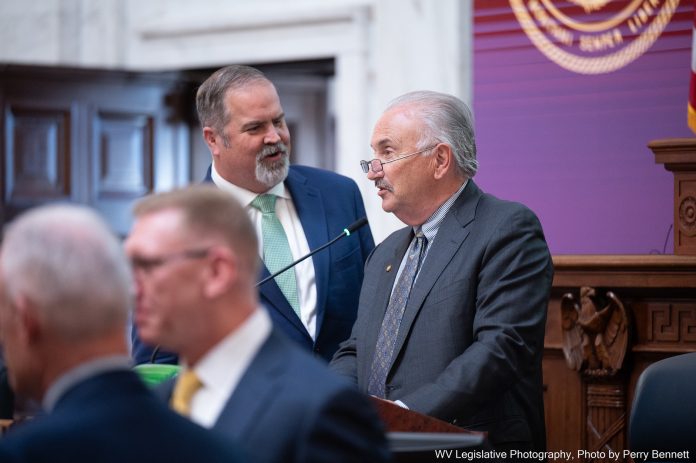The Joint Finance Committee met this afternoon for its interim meeting. First, the committee heard an update from the Department of Revenue. October general revenue collections are $15 million below estimates. The General Revenue is $13.8 million under FY 2024-2025 estimates. October State Road Fund collections are about $14.7 above estimates, due to federal reimbursements. The State Road Fund is $20.2 million under FY 2024-2025 estimates.
The Committee received an update on the Coal Worker’s Pneumoconiosis Fund. The CWP has a surplus of $38.7 million. While the fund closed in 2005, the Office of the Insurance Commissioner receives yearly claims. In FY23, 336 claims were assigned. In FY24, 286 claims were assigned. Claim assignment does not mean the claim meets the requirements to receive funds from CWP. Some do: others receive funds from the federal Black Lung Program.
The Tourism Department presented an update. In 2023, the state had 75 million visitors, which led to an $8.7 billion in economic impact in all 9 travel regions and all 55 counties. The tourism industry has produced over $1 billion in tax revenue. The direct spending impact is $6.3 billion annually. Daily visitor spending totals $17 million. Currently, there are 60,000 tourism jobs in the state, which receive $2.1 billion in income.
The Tourism Department has worked to bring in private investment, such as the rail explorers in Clay County, Oglebay improvements, and renovations to Shepherdstown Opera House. Through the Waterfall Trail and Paranormal Trail, the Department increased traffic throughout the state. State Parks continue to play an important role in tourism.
The Department wants to continue to invest in the tourism and hospitality workforce. It has partnered with the Department of Education to create a tourism curriculum in all 55 counties, which has 13,000 students K-12 enrolled. Two hundred teachers received training about tourism opportunities. The Department of Tourism offers free online hospitality and tourism courses. The Governor’s School for Tourism was hosted over the summer. It was a twelve-day road trip for students, beginning at Independence Hall. The group then traveled to each of the 9 travel regions. By doing this, students could see tourism careers in the state.
The Department Continues to change the perception of West Virginia through public relations. The state has been featured in several travel magazines including National Geographic, TIME, and Southern Living.
The committee also received an update on the Cyber Security Program at Marshall University. Marshall will have the second-largest Institute for Cyber Security in the county. The Institute is a collaboration of Marshall University, West Virginia University, and West Virginia State University. The Institute will be part of an Innovation District, which will connect Marshall to downtown Huntington. The building will have five floors and the higher-level floors will require more security clearance to access. The building will have academic spaces, Department of Defense spaces, and private, public, retail, and event spaces. The Security Operation Center will be a working lab for students. They will work next to DOD employees.
Construction is progressing. The project is in the design development phase and demolition is about to start. The project has spent $2.9 million on site development, design, and architecture fees.
The National Center of Excellence for Cyber Security in Critical Infrastructure is a government, academic, and industry partnership. Initial partners include the Department of Homeland Security, Department of Defense, State of West Virginia, West Virginia National Guard, Palo Alto, Oxford, and many others. The Center’s pillars are to engage the future workforce, increase cyber and technology applied research and innovation, expand cyber and technology-focused analytic partnerships, enrich strategic cyber and technology dialogue, and educate current workforces.
The final presentation for the committee was from WVU Cancer Institute about its quest for a National Cancer Institute (NCI) Designation. An NCI designation is a grant which would be renewed every five years. NCI-Designated Cancer Centers have nationally recognized cancer scientists, NCI and NIH-funded research, practice-changing clinical trials, are a pipeline for training and workforce development, and can impact and lessen the cancer burden.
There are about 75 NCI Centers in the United States. WV is one of 13 states that do not have an NCI Center. WVU is seeking an NCI designation to help diagnose patients earlier and provide instate treatment so patients can get care closer to home and return to work sooner. This can also reduce healthcare costs for patients.
An NCI designation can attract and retain top talent in the field. Its programs can create a pipeline of providers and researchers through cancer training programs. A higher quality of care will be available to patients. New jobs will be created. Start-up companies could be formed, and new industry partnerships could develop through cancer research.
To become an NCI Cancer Center, WVU Cancer Institute is expanding its clinical services, as WVU Health System has expanded across the state. WVU Cancer Institute is also completing research, as it has a specimen repository to study the cancers of the state. The achievement of the designation could take five to ten years. Through appropriated money, the WVU Cancer Institute plans to expand research for informed clinical practice.

